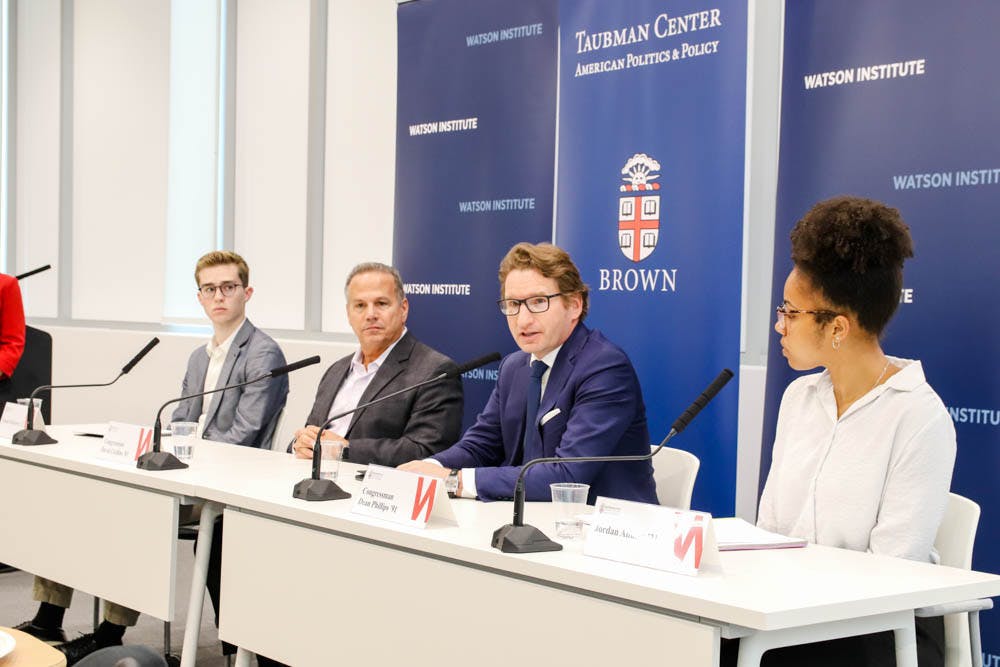Congressmen David Cicilline ’83 (D-RI) and Dean Phillips ’91 (D-MN) returned to campus Monday to discuss climate change, the societal impacts of wealth distribution and Brown’s impact on their trajectory to Congress.
Co-sponsored by the Taubman Center for American Politics and Policy and the Watson Institute for International and Public Affairs, “From Brown to Congress” was driven by questions drafted by students from POLS 0010: “Introduction to the American Political Process” and members of the audience.
Two students representing the environmental activist group Sunrise Rhode Island opened the audience-led Q&A by thanking Cicilline for his support of the Select Committee for the Green New Deal and co-sponsoring Rep. Alexandria Ocasio-Cortez’s (D-NY) resolution for a Green New Deal. The students followed this statement by asking Phillips why he has yet to sign on to the resolution.
Lauren Maunus ’19, who attended the talk as a Sunrise RI representative, said the group wanted to direct their efforts at Phillips due to his lack of co-sponsorship for the Green New Deal. Through this contrast, the activists hoped to use the congressmen’s statuses as colleagues and panel members to “put them in conversation to try to build some pressure,” she added.
“As someone who has driven an electric car for seven years, has a geothermal system in his house, has invested in clean energy companies, is co-sponsoring Ted Deutch’s Carbon Fee, I care (about climate change). … My rationale is just who I am, and I’m pragmatic,” Phillips responded. “You’ve gotta do (change) incrementally, which I know is a dirty word when it comes to changing things that need change fast,” he added. “But if we’re going to do this, it’s going to get done only with Republican support.”
“I’m doing the down and dirty work, if you will … trying to build coalitions with people who are actually very like-minded on the other side of the aisle,” Phillips said, continuing his discussion of climate change policy. However, due to the “dynamic we have right now in our politics … every single Republican is opposed to (the Green New Deal).”
“I was not shocked at all to hear Representative Phillips’ response,” Maunus said after the event. Incrementalism “is a common trope amongst Democrats to acknowledge the urgency of climate change,” she added, referencing her perception of Democratic politicians’ tendency to use partisan divides as an excuse for not taking action.
Along with Phillips’ discussion of partisanship barriers, Cicilline pointed to the energy industry’s financial influence on the Republican party as an obstacle to climate change policy. “There’s no disagreement about the underlying policies within the Democratic Caucuses. We’re fighting against a Republican caucus that by and large resists the science of climate change and is bought and sold by big fossil fuel,” he said.
Prompted by a question about the University’s duty to the city of Providence, Phillips discussed the financial responsibility of institutions of higher education. Universities “in this country are aggregating tens of billions of dollars in their endowments and (are) only required to employ five percent of that annually, which means they are going to continue to grow and grow and the rich will become richer,” Phillips said.
“Despite that, we have hundreds of thousands, if not millions, of young American people who wish to achieve education but can’t afford it or can’t access it,” he added, posing the question of whether or not policy should be enacted to share or distribute more than that five percent.
During the event, both congressmen reflected on Brown’s effect on their political careers. “This place taught me to not just watch and observe but to act and participate, and lo and behold, here I am.” Phillips said. Through a course he took at the University, Phillips developed his desire for political justice and reform. “No matter how much trust I was raised to have in my government and the people who operate it, truth is more important and not always available to us.”
“Brown definitely played a role in my interest in politics,” Cicilline said, referencing his role in the formation of the College Democrats with two fellow students during his time at the University. Involvement in political activities as a student reinforced “the understanding that if you’re going to effect change you have to be in the game, you have to be involved, you have to be engaged; running for office seemed like an obvious way to do it,” he added.
For Eamon McKeever ’22, the chance to ask the representatives questions as a member of the panel was a unique opportunity. “It wasn’t just something you’d get to do that often, have two Brown grads, current congressmen (and) an awesome opportunity to get to ask them questions,” he said.
Jordan Allums ’21, a Herald columnist, was similarly excited to take part in the panel, highlighting the importance of allowing students to participate in such events. It is“really important to have these opportunities open and not have to be a member of an exclusive club or board,” she said.





